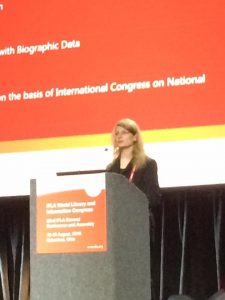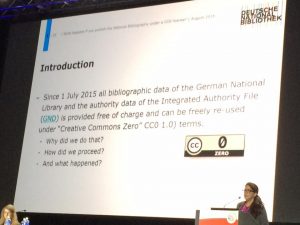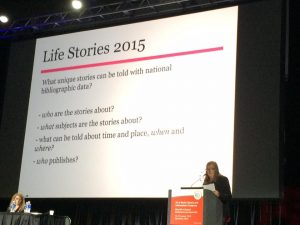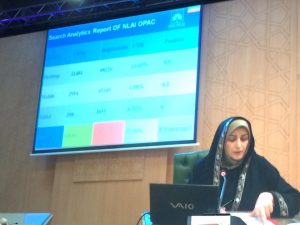The Bibliography Section is proud to announce the latest addition to the Register! Please visit. The Register now contains information for 45 countries!
Category Archives: New Developments & Announcements
Bibliography@IFLA WLIC 2016: Opening the National Bibliography: transforming access to data and building connections
The Bibliography Section organized a thought-provoking program in Columbus! We learned about visualizing biographic data in Sweden, using CCo in Germany, and Search Engine Optimization in Iran. Please visit the IFLA Library to read our authors’ papers at http://library.ifla.org/view/conferences/2016/2016-08-18/716.html
2016 Call for Papers
The Bibliography Section would like to announce its panel program for IFLA WLIC 2016: Opening the National Bibliography: Transforming Access to Data and Building Connections.
National bibliographies provide a valuable record of the intellectual output of a country and its cultures. Formatting national catalog data to be harvestable, or presenting it as linked data, opens these resources to scholars worldwide. In this panel session, we invite papers discussing how national bibliographies have been made more accessible and the possibilities opened by that accessibility. Papers can address methodology for providing harvestable and/or linked data, how national bibliographies can be used in creating new knowledge, and national bibliographic data can be used in scholarly communication.
Please submit paper proposals of less than 500 words by *10 February 2016* to:
Rebecca Lubas
Please also feel free to ask questions about the scope of your proposal.
Guidelines For The Future – Sharing Best Practice For National Bibliographies In A Digital Age
The changes brought about by the World Wide Web together with the dramatic growth of digital media have called into question many key assumptions on which national bibliography were founded. At the IFLA Bibliography Standing Committee’s Warsaw satellite meeting to the IFLA 2012 Congress a new web based resource was announced to replace the original printed National Bibliographies in the Digital Age: Guidance and New Directions (2009). After several years of development this new resource will be launched at the IFLA Congress in August 2015.
Why create this new resource?
In an era of disruptive change libraries require authoritative and current best practice guidance on an increasing range of bibliographic issues. The rapidly evolving nature of the subject matter means that a more flexible, open and dynamic solution than traditional printed text is needed. To address this need the IFLA Bibliography Standing Committee has created ‘Best Practice for National Bibliographic Agencies in a Digital Age’ using the new ‘Book Page’ option available on IFLA’s web site.
The new resource is not intended to be prescriptive since bibliographic control inevitably varies widely from country to country and local requirements may be influenced by financial, legal or practical constraints. A number of potential options will therefore be presented to enable their application to be tailored according to individual circumstances, with examples and use cases given to illustrate the possible range of approaches
What topics are covered?
The new resource aims to offer information on a wide range of topics of interest to those involved in the management of bibliographic information. Examples include:
- Service delivery & lifecycle
- Resource description & standards
- Business models & administration
- How to demonstrate the continuing utility & relevance of services?
- When to create, develop or cease services?
- How to decide on appropriate service delivery options
- What options exist for user support?
How is the resource organised?
In order to ensure the site is easy to use and yet remain flexible for future developments it has been organised by key themes which are further divided by topic. The main themes are:
- Background
- Organisation
- Purpose and value
- Scoping and selection
- Resource description and standards
- Service delivery
- Glossary/Useful links
- Bibliography
These thematic sections provide links to back up sources to ensure continuing relevance and currency and will be supplemented by ‘real world’ cases that show how libraries are tackling the challenges. It is hoped this sharing of experience will benefit not only new and existing national bibliographic agencies but all who wish to respond to the bibliographic opportunities offered by new technologies and media.
How will the site be kept up to date?
Following the launch, the IFLA Bibliography Standing Committee intends to implement an annual work cycle to maintain and extend the resource as new areas of interest emerge. The SC is also seeking input from experts and other IFLA committees to contribute text or review sections in order to keep it as accurate and relevant as possible.
Japanese National Bibliography of Online Publications
On July 1, 2013, the e-legal deposit of online publications started based on the National Diet Library Law revised in June 2012. According to this, the National Diet Library, Japan (NDL) started to offer the Japanese National Bibliography of online publications on March 25th, 2014. The NDL also started to provide the Japanese National Bibliography through the OAI-PMH.
Further information: 「全国書誌データ提供」のページ (In Japanese)
German National Library Offers Over 11 million MARC21 Records Under CC0 Open License
11.5 million free bibliographic data items now available from the German National Library in MARC 21 format
All the bibliographic data of the German National Library offered under “Creative Commons Zero” conditions are available free of charge as a complete package in MARC 21 format for free use. Included are more than 11.5 million bibliographic data items.
The bibliographic data up to the 2011 bibliography year are currently offered under a “Creative Commons Zero” licence (CC0). Free registration is required in order to use the data. Charges are applied to bibliographic data of the current and the previous year. The data of the next bibliography year is added to the package of free data in the first quarter of each new year.
The intention is to provide all data in all formats free of charge and under CC0 conditions for free use from mid-2015. This represents the German National Library’s response to the growing demand for freely available metadata.
Further information:
• Data Service
• Business model
A report on the licensing model: “Licensing Library and Authority Data Under CC0: The DNB Experience“ by Lars Svensson is now available.
Contact: datendienste@dnb.de
Danish National Bibliography as linked open data
A testfile containing books in the Danish National Bibliography 2010 and 2011 as linked open data has been published by DBC (Danish Bibliographic Centre) on oss.dbc.dk. A SPARQL endpoint to the corresponding triple store is available at http://lod.dbc.dk/webui/. DBC will continue working with LOD, expanding the scope to other types of material and authority data, providing more links and moving towards publishing the National Bibliography on a regular basis as LOD



